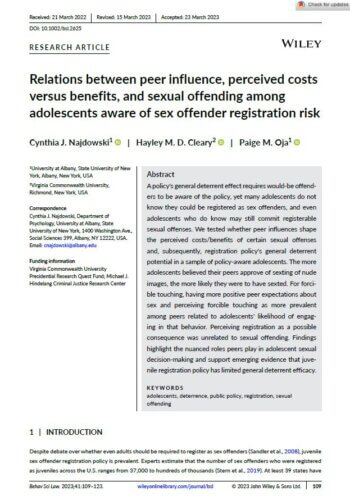Sexting
Relations between peer influence, perceived costs versus benefits, and sexual offending among adolescents aware of sex offender registration risk.
Open Access: No.
Abstract
A policy’s general deterrent effect requires would-be offenders to be aware of the policy, yet many adolescents do not know they could be registered as sex offenders, and even adolescents who do know may still commit registerable sexual offenses. We tested whether peer influences shape the perceived costs/benefits of certain sexual offenses and, subsequently, registration policy’s general deterrent potential in a sample of policy-aware adolescents. The more adolescents believed their peers approve of sexting of nude images, the more likely they were to have sexted. For forcible touching, having more positive peer expectations about sex and perceiving forcible touching as more prevalent among peers related to adolescents’ likelihood of engaging in that behavior. Perceiving registration as a possible consequence was unrelated to sexual offending. Findings highlight the nuanced roles peers play in adolescent sexual decision-making and support emerging evidence that juvenile registration policy has limited general deterrent efficacy.
Relevance
Adolescents are more likely to sext if they believe that their peers approve of sexting – regardless of how common they think that sexting actually is among their peers. More importantly, the perception of peer approval outweighs any concern about the possibility of having to register as a sex offender. That is to say, peer norms are a more important influence on an adolescent’s sexting behavior than the awareness that sexting could be prosecuted for ‘child pornography.’
Citation
Najdowski, C. J., Cleary, H. M. D., & Oja, P. M. (2023). Relations between peer influence, perceived costs versus benefits, and sexual offending among adolescents aware of sex offender registration risk. Behavioral sciences & the law, 41(2-3), 109–123. https://doi.org/10.1002/bsl.2625

